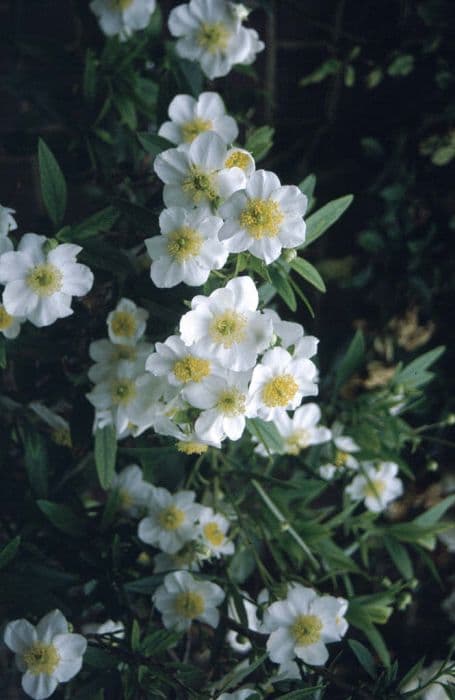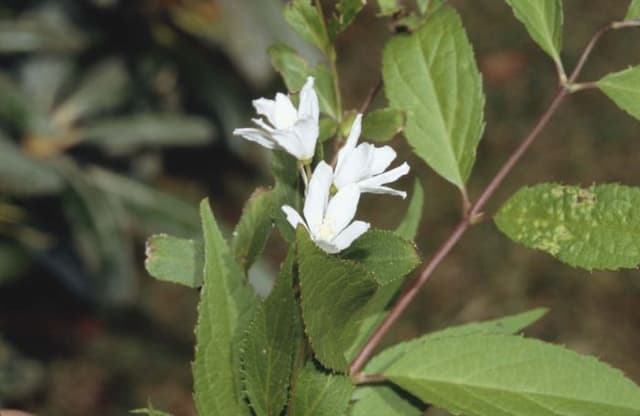Deutzia Deutzia × hybrida 'Iris Alford'

ABOUT
Deutzia × hyrida 'Iris Alford' is a flowering ornamental shrub known for its graceful appearance. The plant is adorned with clusters of delicate, star-shaped flowers that usually radiate a soft pink hue. These flowers are small and typically bloom in abundance, creating a profuse and eye-catching display in the springtime. The leaves of 'Iris Alford' are opposite, simple, generally ovate or lanceolate in shape, with a pointed tip and serrated edges. The foliage takes on a bright green color, which provides a lovely backdrop to the contrasting flowers. Over the seasons, the leaves may change color, adding interest to the garden even when the plant is not in bloom. The plant has a bushy growth habit with multiple stems that emerge from the base, giving it a full and lush look. The stems tend to arch gracefully as they mature, adding to the overall elegance of the shrub. Its branching pattern and the distribution of flowers make it an attractive addition to mixed borders, and when in bloom, Deutzia × hybrida 'Iris Alford' can become a focal point in the garden. The shrub can also be used for creating informal hedges or as a stand-alone specimen, depending on how it is pruned and maintained. Texture-wise, the bark of the plant's stem is generally smooth, and it can add structural interest to the winter garden once the leaves have fallen. The presence of the flowers not only adds visual appeal but can also attract pollinators like bees to the garden, thereby supporting local ecosystems. While the plant's overall dimensions are not to be specified, it is essential to understand that 'Iris Alford' can be versatile and can fit into various garden spaces depending on how it's grown and maintained, contributing to the beauty and biodiversity of gardens and landscapes.
About this plant
 Names
NamesSynonyms
Hybrid Deutzia, Slender Deutzia, Pride of Rochester
Common names
Deutzia × hybrida 'Iris Alford'.
 Toxicity
ToxicityTo humans
Deutzia is not commonly known to be toxic to humans. However, as with any plant material, individual allergies or sensitivities might occur. If you suspect poisoning, it is important to consult a healthcare professional. Ingesting any part of this plant typically does not cause poisoning symptoms in humans.
To pets
Deutzia is not commonly known to be toxic to pets. It is considered non-toxic for dogs and cats. While it is not expected to cause poisoning symptoms, ingestion of any plant material can potentially cause mild gastrointestinal upset, such as vomiting or diarrhea, in some pets due to the unusual nature of the substance in the animal's diet. If any adverse reactions are noted, consult a veterinarian.
 Characteristics
CharacteristicsLife cycle
Perennials
Foliage type
Deciduous
Color of leaves
Green
Flower color
Pink
Height
4-5 feet (1.2-1.5 meters)
Spread
4-5 feet (1.2-1.5 meters)
Plant type
Shrub
Hardiness zones
5-8
Native area
Asia
Benefits
 General Benefits
General Benefits- Attracts Pollinators: Provides food and habitat for bees, butterflies, and other beneficial insects.
- Low Maintenance: Requires minimal care once established, making it an easy choice for gardeners of all levels.
- Aesthetic Appeal: Adds beauty to landscapes with its abundant blooms and overall elegant appearance.
- Seasonal Interest: Offers a visually appealing display, especially in the spring when the flowers are in bloom.
- Drought Tolerant: Can withstand periods of low water, reducing the need for frequent irrigation after establishment.
- Versatile Landscaping: Suitable for a variety of garden styles, including borders, foundation plantings, and as a specimen plant.
- Tolerant of Different Soil Types: Can grow in a range of soil conditions, from loamy to clay soils.
- Deer Resistant: Less likely to be damaged by deer, which can be an advantage in areas where deer predation is a problem.
 Medical Properties
Medical PropertiesThis plant is not used for medical purposes.
 Air-purifying Qualities
Air-purifying QualitiesThis plant is not specifically known for air purifying qualities.
 Other Uses
Other Uses- Photography backdrop: The vibrant blooms of Deutzia can provide an exquisite natural backdrop for portrait and macro photography sessions.
- Art inspiration: Artists may draw inspiration from the Deutzia's delicate flowers for paintings, illustrations, or fabric designs.
- Education: Botany educators can use Deutzia to demonstrate plant breeding and hybridization techniques to students.
- Culinary garnish: Although not commonly eaten, the flowers can be used as an ornamental garnish for plating in high-end culinary presentations.
- Wedding decor: Clusters of Deutzia flowers are sometimes used in wedding bouquets or as part of table centerpieces for a natural, romantic ambiance.
- Handicrafts: Dried Deutzia flowers can be incorporated into handmade paper, potpourri, or natural jewelry items such as pressed flower pendants.
- Eco-friendly confetti: Dried petals of Deutzia flowers can be used as biodegradable confetti for celebrations and eco-conscious events.
- Thematic gardens: Deutzia can be a feature in moon gardens, which are designed to be enjoyed in the evening, as their flowers may catch the moonlight.
- Floral arrangements: Deutzia branches can be used in floral arrangements to add volume and a spray of small flowers to the composition.
- Seasonal festivals: In areas where Deutzia is in bloom, local festivals might celebrate the flowering season with garden tours featuring Deutzia prominently.
Interesting Facts
 Feng Shui
Feng ShuiThe plant Deutzia is not used in Feng Shui practice.
 Zodiac Sign Compitability
Zodiac Sign CompitabilityThe plant Deutzia is not used in astrology practice.
 Plant Symbolism
Plant Symbolism- Innocence and Purity: Deutzia, known as "Slender Deutzia," often symbolizes innocence and purity due to its delicate white flowers that give off a pure and clean appearance.
- Humility: The simple beauty of the Slender Deutzia, without being overly showy, lends itself as a symbol for humility and modesty.
- Rejuvenation and Renewal: Slender Deutzia blooms in the spring, symbolizing the cycle of rebirth and new beginnings that spring represents.
 Water
WaterDeutzia flowering shrub should be watered deeply once a week during dry spells or when the plant is establishing. Provide about 1 to 1.5 gallons of water at each irrigation session. In cooler climates or during the rainy season, reduce watering to every other week or less, depending on soil moisture levels. Always check the soil moisture by feeling the soil an inch below the surface; if it’s dry, it’s time to water. Avoid overhead watering to minimize leaf diseases, and water early in the morning to allow foliage to dry throughout the day.
 Light
LightDeutzia thriving in partial shade to full sun, the Deutzia should be placed in a location where it can receive at least 4 to 6 hours of sunlight daily. Morning sun with some afternoon shade often provides ideal lighting conditions. Avoid deep shade as it may result in fewer blooms and leggy growth.
 Temperature
TemperatureDeutzia prefers moderate temperatures but is adaptable to a range of conditions. It can survive the winter cold down to about 5 degrees Fahrenheit but may suffer some die-back. The ideal temperature range for flourishing growth is between 60 and 70 degrees Fahrenheit. However, the plant can tolerate summer highs up to 85 degrees Fahrenheit without stress.
 Pruning
PruningPruning Deutzia should be done just after the shrub finishes flowering, usually in late spring or early summer. This is to encourage new growth which will bear next year's blooms. Remove any dead or diseased wood, and thin out crowded stems to allow light and air into the plant. To maintain the desired shape and size, cut back up to one-third of the older stems annually.
 Cleaning
CleaningAs needed
 Soil
SoilDeutzia prefers well-draining soil with a mixture of loam, peat, and sand, enhancing drainage and fertility. Ideally, the soil pH should be slightly acidic to neutral, ranging from 6.0 to 7.0 for optimal growth.
 Repotting
RepottingDeutzia, also known as hybrid deutzia, should generally be repotted every 2 to 3 years to refresh the soil and provide room for root growth, ensuring the plant's health and vigor.
 Humidity & Misting
Humidity & MistingHybrid deutzia thrives best in moderate humidity levels typical of many temperate regions; they do not require special humidity considerations beyond what is found naturally outdoors.
 Suitable locations
Suitable locationsIndoor
Ensure bright light, well-draining soil, and room for growth.
Outdoor
Plant in sun to partial shade, well-drained soil, prune after flowering.
Hardiness zone
5-8 USDA
 Life cycle
Life cycleDeutzia × hybrida 'Iris Alford', commonly known as the Hybrid Deutzia, begins its life as a seed, which upon successful germination, develops into a small seedling. As the seedling establishes, it progressively grows into a young plant through the accumulation of leaves and the elongation of its stem. Upon reaching maturity, the Hybrid Deutzia forms woody structures and branches, and it produces clusters of fragrant, showy flowers, typically in the late spring or early summer. After pollination, often by insects attracted to its flowers, the plant develops small fruits containing seeds which, when mature, are dispersed into the environment to begin a new generation. Throughout its life, Deutzia × hybrida 'Iris Alford' experiences annual cycles of growth and dormancy, with new foliage appearing each spring and old foliage being shed in autumn or winter in temperate climates. With proper care, the Hybrid Deutzia can live for many years, continuing to flower annually and contributing to the garden's aesthetic appeal.
 Propogation
PropogationPropogation time
Spring to Early Summer
The most popular method of propagation for the Deutzia × hybrida 'Iris Alford', commonly known as Deutzia, is through softwood cuttings. This is typically done in late spring or early summer when new growth is still tender and green. Cuttings should be about 4 to 6 inches long and taken from healthy, disease-free branches. After removing the lower leaves, the cut end is often dipped in rooting hormone before being placed in a well-draining potting mix. The cuttings are then kept moist and in a warm area with indirect sunlight. Roots usually develop within a few weeks, after which the new Deutzia plants can be gradually acclimatized to outdoor conditions before planting out.







![Hydrangea [Strong Annabelle]](/_next/image?url=https%3A%2F%2Fplants-admin.emdemapps.com%2Fimages%2Fplants%2F%2Fimages%2F604b54db37d34.png&w=640&q=75)

